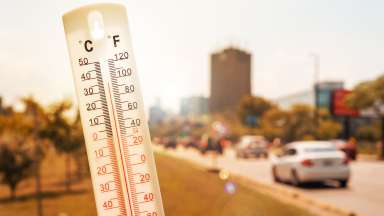Jump To:
Extreme heat is defined as a long period (two to three days) of high heat and humidity with temperatures above 90 degrees. Humidity increases the feeling of heat (measured by the heat index).
Risks from extreme heat:
- Heat exhaustion and heat stroke
- Older adults, children, and sick or overweight individuals are at greater risk for heat illness.
If you are under an extreme heat warning:
- Visit Wake.gov for cooling center locations during periods of extreme heat.
- Find air conditioning.
- Avoid strenuous activities.
- Watch for heat illness.
- Wear light clothing.
- Check on family members and neighbors.
- Drink plenty of fluids.
- Watch for heat cramps, heat exhaustion and heat stroke.
- Never leave people or pets in a closed car.
Before an extreme heat event
- Know where there are places in your community where you can go to get cool.
- Parks, pools, splash pads, community centers, libraries
- Keep your home cool by doing the following:
- Cover windows with drapes or shades.
- Weather-strip doors and windows.
- Use window reflectors, such as aluminum foil-covered cardboard, to reflect heat back outside.
- Add insulation to keep the heat out.
- Use attic fans to clear hot air.
- Install window air conditioners and insulate around them.
- Learn to recognize the signs of heat-related illness.
During an extreme heat event
- Never leave a child, adult, or animal inside a vehicle on a warm day.
- Find places with air conditioning. Libraries, shopping malls, and community centers can provide a cool place to take a break from the heat.
- If you’re outside, find shade. Wear a hat wide enough to protect your face.
- Wear loose, lightweight, light-colored clothing.
- Drink plenty of fluids to stay hydrated. If you or someone you care for is on a special diet, ask a doctor how best to accommodate it.
- Do not use electric fans when the temperature outside is more than 95 degrees, as this could increase the risk of heat-related illness. Fans create air flow and create a false sense of comfort, but do not reduce body temperature.
- Avoid high-energy activities.
- Check yourself, family members, and neighbors for signs of heat-related illness
Heat-related Illness
Know the signs of heat-related illness and the ways to respond to it:
Heat Cramps
- Signs: Muscle pains or spasms in the stomach, arms, or legs
- Actions: Go to a cooler location. Remove excess clothing. Take sips of cool sports drinks with salt and sugar. Get medical help if cramps last more than an hour.
Heat Exhaustion
- Signs: Heavy sweating, paleness, muscle cramps, tiredness, weakness, dizziness, headache, nausea or vomiting, or fainting
- Actions: Go to an air-conditioned place and lie down. Loosen or remove clothing. Take a cool bath. Take sips of cool sports drinks with salt and sugar. Get medical help if symptoms get worse or last more than an hour.
Heat Stroke
- Signs: Extremely high body temperature (above 103 degrees) taken orally; red, hot, and dry skin with no sweat; rapid, strong pulse; dizziness; confusion; or unconsciousness
- Actions: Call 911 or get the person to a hospital immediately. Cool down with whatever methods are available until medical help arrives.
Cool for Wake: This Wake County program offers free fans and air conditioning units to vulnerable residents. Program begins in May and runs through September each year.
Extreme Heat Temperatures Safety Tips on Ready.gov
